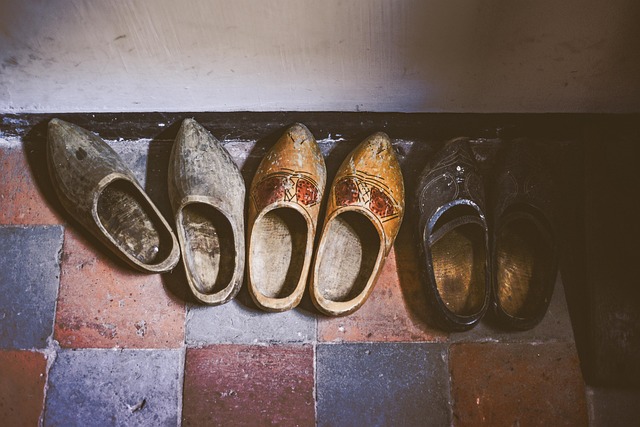Clogged drains, caused by grease, hair, soap scum, can be effectively cleared with a natural remedy of baking soda and vinegar. This eco-friendly solution creates a frothy reaction that breaks down blockages without damaging pipes. Boiling water, a powerful solvent, complements this mixture for minor clogs. Baking soda vinegar is an affordable, safe alternative to commercial cleaners, ideal for regular maintenance. Follow a simple step-by-step guide: mix half cups each of baking soda and vinegar in a bowl, pour into drain, let sit, then carefully pour boiling water down the drain. Use sparingly for minor blockages; assess severity before trying this method.
Are you tired of dealing with stubborn drain clogs? Boiling water, baking soda, and vinegar can be a game-changer. This all-natural, cost-effective solution offers a simple and effective way to unclog drains caused by hair, soap scum, and other common obstructions. In this article, we’ll explore the science behind these household ingredients, provide a step-by-step guide for unclogging your drains, and share tips to avoid common mistakes when using this powerful trio—baking soda and vinegar.
- Understanding Clogged Drains and Their Causes
- The Science Behind Boiling Water's Dissolving Power
- Baking Soda and Vinegar: An Effective Natural Solution
- Step-by-Step Guide to Unclogging with Hot Water, Baking Soda, and Vinegar
- Common Mistakes to Avoid When Using This Method
Understanding Clogged Drains and Their Causes

Clogged drains can be a common household nuisance, causing water flow issues and potential damage if left unattended. Understanding the causes behind these clogs is essential for effective prevention and treatment. Drains often get blocked due to a buildup of grease, hair, soap scum, and various debris that accumulate over time. These substances can congeal and form hard-to-dislodge deposits, especially when mixed with hot water and sewage.
One natural and effective remedy for minor clogs is the combination of baking soda and vinegar. Baking soda reacts with acetic acid in vinegar to create a frothy reaction that can help break down the clog. This simple, cost-effective solution is an eco-friendly alternative to harsh chemicals and can often clear out stubborn blockages without causing damage to pipes or plumbing systems.
The Science Behind Boiling Water's Dissolving Power

Boiling water has long been a household remedy for clearing minor clogs in drains and pipes. The science behind its effectiveness lies in its temperature and chemical properties. When water reaches boiling point, it becomes an incredibly powerful solvent, capable of dissolving a wide range of substances.
This is primarily due to the combination of high heat and the introduction of vapor pressure. Boiling water carries a significant amount of thermal energy, which can break down the bonds between clog-causing materials like grease, hair, and soap scum. Additionally, the rapid evaporation of boiling water creates a powerful force that helps dislodge and flush away these accumulated debris. Pairing boiling water with ingredients like baking soda and vinegar amplifies its dissolving power even further; baking soda acts as a natural cleaning agent, while vinegar adds acetic acid to enhance the chemical reaction, making it an effective, easy-to-access drain cleaner for everyday use.
Baking Soda and Vinegar: An Effective Natural Solution

Baking soda and vinegar are common household items that, when combined, create an effective natural solution for clearing minor clogs. This simple mixture is a popular go-to remedy for many people due to its accessibility and affordability. The process starts with pouring baking soda into the clogged drain followed by a mixture of equal parts white vinegar and water. As the vinegar comes into contact with the baking soda, it triggers a chemical reaction that helps break down and dissolve the buildup in the pipes.
The combination of these two substances creates a fizzing action that not only cleans but also acts as a natural acid to clear out any stubborn obstructions. This DIY approach is particularly useful for minor drain issues and offers an eco-friendly alternative to commercial cleaning products. Additionally, it’s a safe and gentle method that won’t damage pipes or leave harmful residues, making it a smart choice for regular maintenance and keeping drains in good condition.
Step-by-Step Guide to Unclogging with Hot Water, Baking Soda, and Vinegar

Step-by-Step Guide to Unclogging with Hot Water, Baking Soda, and Vinegar
1. Prepare Your Solution: Start by mixing half a cup of baking soda with half a cup of white vinegar in a bowl. This potent combination helps break down grease and soap scum that might be causing the clog. Pour this mixture directly into the blocked drain.
2. Boil Water: While the baking soda and vinegar are taking effect, bring a pot of water to a boil. Once it reaches a rolling boil, carefully pour the hot water down the drain. The sudden introduction of scalding water will help flush out any remaining blockages by expanding and dissolving clogs that have been softened by the baking soda and vinegar mixture.
Common Mistakes to Avoid When Using This Method

When using boiling water and a mixture of baking soda and vinegar to unclog drains, there are some common mistakes to steer clear of. One of the most important things to remember is not to pour the hot water directly onto the drain without first allowing the baking soda-vinegar mixture to do its work. This can cause an intense chemical reaction that might damage pipes or even pose a safety hazard.
Another mistake to avoid is using this method on severe clogs or for extensive pipe issues. Boiling water and the baking soda-vinegar combination are best suited for minor blockages, as they act as a natural cleaner without harsh chemicals. Overusing this method could lead to damage or even more serious clogs. Always assess the clog’s severity before attempting this DIY solution.






